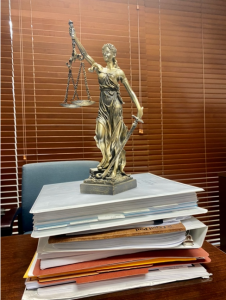The civil legal system runs parallel to the criminal justice system, but has different procedures and goals. The goal of the criminal justice system is to punish offenders for breaking laws, not to compensate or help the victim. The government, specifically the prosecution, makes the decision to bring the charges and initiate the criminal proceedings, and has sole and complete discretion regarding if, when, and how to prosecute the case. Crime victims are largely absent from criminal proceedings. Although Florida does have laws requiring that crime victims be kept informed of the progress of criminal proceedings, they have no meaningful role in those proceedings.
 On the other hand, the civil legal system offers crime victims a way to seek justice against those who have wronged them in a way that is personal, and directly beneficial to them. In many instances, a victim of a crime has the ability to bring a civil lawsuit against the person who committed the crime against them. This has huge implications for a crime victim. Firstly, it gives them the opportunity to have a true and meaningful role in the legal proceedings, as a party to the case. Also, the goal of the civil legal system is to compensate a wronged party for any wrongs done against him or her. In this way, the civil legal system works directly for crime victims, to compensate them directly for the harms they have suffered. If you prevail in a civil matter, you can be compensated for costs arising out of the subject incident, such as medical or mental health care costs, as well as non-economic compensation, such as physical or mental pain and suffering. To learn more about how a civil plaintiff may be compensated, check our previous post “how the civil legal system can help you” by clicking here.
On the other hand, the civil legal system offers crime victims a way to seek justice against those who have wronged them in a way that is personal, and directly beneficial to them. In many instances, a victim of a crime has the ability to bring a civil lawsuit against the person who committed the crime against them. This has huge implications for a crime victim. Firstly, it gives them the opportunity to have a true and meaningful role in the legal proceedings, as a party to the case. Also, the goal of the civil legal system is to compensate a wronged party for any wrongs done against him or her. In this way, the civil legal system works directly for crime victims, to compensate them directly for the harms they have suffered. If you prevail in a civil matter, you can be compensated for costs arising out of the subject incident, such as medical or mental health care costs, as well as non-economic compensation, such as physical or mental pain and suffering. To learn more about how a civil plaintiff may be compensated, check our previous post “how the civil legal system can help you” by clicking here.
If you or someone you know has been the victim of a crime the civil legal system may give you the platform to assert your rights and be compensated for your injuries or suffering. The Law Office of Robert N. Pelier, P.A. not only has decades of experience in civil law, but is also devoted to helping victims of crime in our South Florida community.














